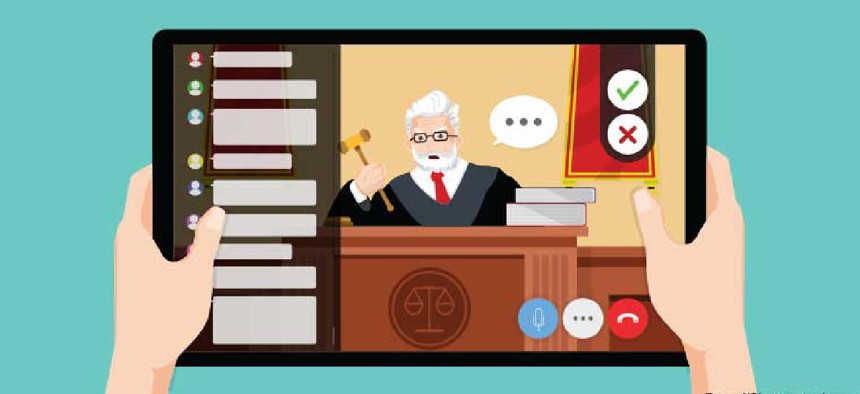Cloud-based video tools keep county operating


Connecting state and local government leaders
Virtual court hearings allowed Elkhart County, Ind., to continue operations amid the closures forced by the coronavirus pandemic.
Virtual court hearings allowed Elkhart County, Ind., to continue operations amid the closures forced by the coronavirus pandemic.
Leveraging Cisco’s new Connected Justice technology solution, the county was able to maintain normalcy despite disruptive public health precautions, county IT Director Matthew Dietz said. Connected Justice is a standards-based videoconferencing solution that works with courts, correctional facilities and community corrections.
“When the pandemic started, we couldn’t allow anybody in the building, we couldn’t hold our normal court sessions, we couldn’t really serve the public like we used to,” Dietz said. “Once we started to see that the severity of the situation wasn’t decreasing -- it was actually increasing -- we started looking for solutions.”
County offices were using Cisco Webex for video meetings and wanted to use it for a virtual courtroom experience. The county worked with Cisco on the solution in June and began using the cloud-based videoconferencing solution that enables an integrated docket dashboard and secure sidebar conversations in separate “rooms.”
The solution verifies users while they are in a virtual lobby, or waiting room. Once they’re in the videoconference, it limits what they can do based on permissions for different roles.
Each of the 19th-century courthouse’s courtrooms is equipped with either a Webex Room 70 Dual or Room 55 Dual collaboration solution, which includes either two 70-inch or two 55-inch display screens. A remote participant may give a presentation on one and the other participant is viewable on the other. They can see and interact with one another, too.
Meetings and remote hearings are streamed live to public-access websites through any service that supports the real-time messaging protocol. “The platform doesn’t tie you to certain hardware,” Dietz said, adding that the county integrated its existing court docket system into Connected Justice using Webex’s open application programming interface.
For corrections, the solution provides virtual visitation services with custom-designed scheduling software that gives those in custody remote access to court appearances, telehealth services and distance learning, in addition to visits with family and friends.
Plus, parole officers can use the solution after prisoners are released to virtually connect and manage cases using a solution from Cisco partner TRACKtech that addresses the challenges of high recidivism rates.
Besides keeping operations running smoothly, the solutions are saving the county money -- for example, by not having to transport people from jails to courtrooms, Dietz said. But the biggest benefits have been in the areas of mental and physical health.
“The biggest impacts that we see and where we benefit are when we had to shut our juvenile detention center,” he said. “These were juveniles that were not allowed to have visitation … [but using] Webex, we deployed our desktops, our iPads, whatever it is, to allow this visitation to happen.”
And through telehealth visits, physicians can assess COVID-positive inmates without exposing others.
Another product, Webex Legislate, helps local governments conduct remote meetings. “If you’re a moderator, you have one set of things that you can use and you can manage the whole meeting, whether you’re going out for voting, whether you’re managing translation, whether you need to be managing some hallway conversations or sidebars that might be happening,” said Cassie Roach, Cisco’s vice president of global public sector. “It also allows people to come in through whatever device they’re managing.”
A range of networking technology secures everything in the collaboration solution – from both official endpoints to whatever devices users have available. Neither solution requires unique connectivity such as high-speed internet or specific devices, she added.
The solutions have staying power beyond the pandemic, Roach and Dietz said. “It will broaden people’s ability to participate in a differentiated way,” Roach said, such as enabling legislators at the local, state and even national levels to connect to meetings virtually.
In Elkhart County, Dietz said the court system will continue to use the solution for meetings such as traffic ticket hearings. “Usually that requires you to show up at the courthouse around 4 p.m., [and] you don’t know how late you’re going to be there before your case gets seen,” he said. “Now we offer a digital solution where we give them a time, they sign into the Webex link … and they conduct their hearing in 15 minutes or less.”
This article was changed Dec. 10 to reflect that Elkhart County courts are only using Connected Justice, not Webex Legislate as may have been previously implied.
NEXT STORY: Google launches Workspace for Government




